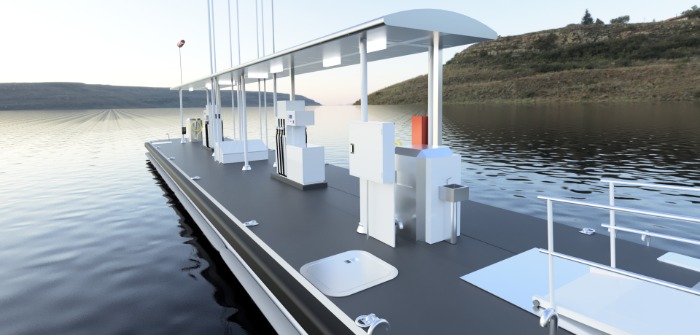Fossil Free Marine has filed for patent and design protection for the company’s newly developed unmanned floating marine fuel station.
Following several years of development which consisted of environmental and risk analyses and certifications carried out by a global certification body, Fossil Free Marine is now aiming to target vessels over 60ft within the commercial and private boat sector.
The 24m-long and 4.3m-wide station complies with strict environmental safety regulations, such as those for freshwater reservoirs, and offers an extremely safe and environmentally friendly storage solution for marine fuels. Furthermore, the system and its tanks are compatible with all types of liquid fuel, including much more corrosive modern biofuels.
With an internal volume of 60m3, fuels are distributed across six separate tanks each measuring 10m3, and even with differing levels of fuel in each tank, the station will stay completely level in the water to ensure safe operations.
The first and second fueling stations are scheduled for production and will be installed near to the center of Stockholm, Sweden, in the second and third quarters of 2022. The stations have been partly funded by a Swedish Government investment grant called KlimatKlivet.
“I am beyond thrilled that we have come to this point in our journey, that started almost 10 years ago, when my co-founder Niklas Sjöö made the first designs for a completely new type of marine fuel station,” said Karl-Oskar Tjernström, co-founder and CEO of Fossil Free Marine.
“During that time, the world has developed in a direction where sustainability and solutions that minimize climate impact have become increasingly important. When rolled out at scale, our new marine fuel station bridges the gap between suppliers of modern renewable drop-in biofuels, and boaters wishing to dramatically reduce their climate impact.”
“Our new marine fuel station, years in the making, is designed based on a risk analysis, performed by one of the leading certification bodies within shipbuilding and marine safety, identifying all potential risks and hazards associated with existing marine stations,” commented Niklas Sjöö, co-founder of Fossil Free Marine. “By using composite technology, originally from the military naval industry, we achieve numerous advantages, such as low weight, high internal volume and compatibility with any type of liquid fuels, like renewable diesel, biogasoline or even coming e-fuels, and it will deliver for at least another 50 years.”



